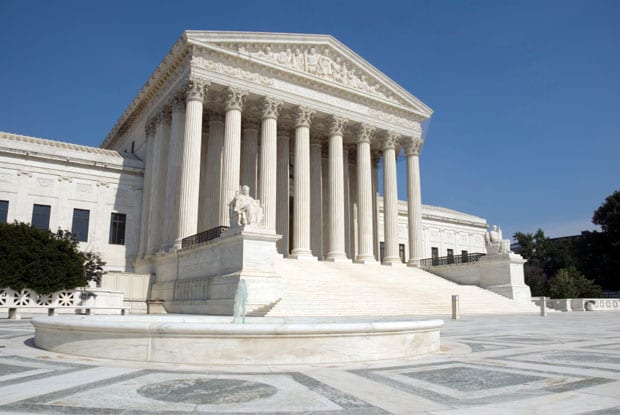
Married on Saturday; fired on Monday.
That’s been the “joke” since at least June 26, 2015, when the U.S. Supreme Court ruled, in Obergefell v. Hodges, that same-sex marriages must be recognized legally across the country. Only it isn’t a very funny joke, because while it was suddenly possible for same-sex marriages everywhere in the U.S. to be legally married, there remained many places where LGBTQ people could also be legally fired because of their sexual orientation or gender identity.
A number of cases on the issue of anti-LGBTQ workplace discrimination have been making their way through the court system in the years since Marriage Equality Day. And tomorrow (Tuesday, Oct. 8), the Supreme Court will hear oral arguments on three of them.
Tomorrow could mark the beginning of the end of anti-LGBTQ workplace discrimination, or it could mark the beginning of a HUGE step backward in the LGBTQ equality movement.
The Supreme Court will be hearing oral arguments in three cases addressing whether Title VII of the Civil Rights Act of 1964 prohibits workplace discrimination on the bases of sexual orientation and gender identity. Two of the cases — Bostock v. Clayton County and Georgia and Altitude Express Inc. v. Zarda — address sexual orientation and have been merged for the purpose of Supreme Court consideration. The third case, Harris Funeral Homes v. Stephens, addresses gender identity.
According to the UCLA School of Law’s Williams Institute (a think tank on sexual orientation and gender identity law and public policy), there are an estimated 7.1 million lesbian, gay and bisexual workers, ages 16 and older, in this country, and half of them — more than 3.5 million LGB people — live in states without specific statutory protections against anti-LGB discrimination in employment.
There are about 1 million workers, ages 16 and older, that identify as transgender in this country. More than half of them — some 562,000 people — live in states without express statutory protections against gender identity discrimination in employment.
A recent Williams Institute survey shows that 60 percent of LGB people reported being fired from a job or being denied a job, and 48 percent reported being denied a promotion or receiving a negative evaluation. That’s compared to 40 percent and 32 percent respectively among heterosexuals.
Between 2012 and 2016, 9,127 charges alleging sexual orientation or gender identity discrimination were filed with the Equal Employment Opportunity Commission, according to another recent study. About half of those included claims of discriminatory terminations and harassment, Williams Institute officials noted.
That study also found proportionally more allegations of serious discrimination issues — including harassment, discharge and retaliation — in states without anti-discrimination statutes.
Adam Romero, the Arnold D. Kassoy scholar of law and federal policy director at the Williams Institute, said, “Employment discrimination based on sexual orientation or gender identity can have a profound impact on the financial, emotional and physical well-being of LGBT people. Because more than half of the states fail to prohibit sexual orientation and gender identity discrimination, the court’s decision [on the three cases being heard this week] will dictate whether millions of LGBT people have any remedy at all against discrimination at work.”
In other words, the financial well-being and job security of millions of people are at stake in these cases. And their fates — our fates — lie in the hands of a court that has been aggressively pushed to the right over the last three years, thanks to the machinations of the Trump administration and anti-LGBTQ forces in Congress.
You can find more information on how the court’s decision in these three cases will impact LGBTQ people in the Williams Institute’s amici briefs, located here.
— Tammye Nash
















in NYC
THE PLAYWRIGHTS SANCTUARY
WILL PRODUCE A NEW WORK BY
– AWARD WINNING INTERNATIONAL PLAYWRIGHT
DR LARRY MYERS
IT IS “…LIVING IN ELLIPSES.. ‘”